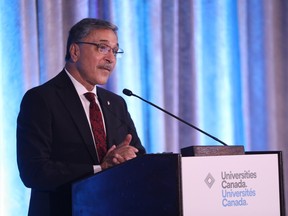"We will do everything we can to make sure that the Canadians who want to study at McGill have the opportunity to do that."

Quebec’s plan to collect more tuition money from students outside the province is not a done deal yet, says the principal of McGill University.
Quebec is planning a major overhaul of its complex university tuition structure for out-of-province students, including charging more in tuition for anglophone universities.
Article content
This is presenting a major hurdle for the province’s three major English-language universities – McGill, Concordia and Bishop’s — where new students from out of province would face over $17,000 in tuition, almost double what they pay now. International student tuition would rise to at least $20,000.

Article content
Deep Saini, who began his term as the principal and vice-chancellor of McGill on April 1, was in Ottawa on Wednesday as he takes the helm as the board chair of Universities Canada.
“The heartening part of it is that it’s not a done deal yet,” said Saini in a brief interview during a break from Universities Canada’s fall meeting.
“It is an intent that has been announced. And we are working very hard to bring the facts to the government and help them learn about the consequences that they may not have thought about in advance. And we’re hoping that we will be able to turn it around.”
The changes are to take effect next fall, sparking fears that it will discourage students from other provinces and outside the country from studying in Quebec — and causing students contemplating applying to anglophone universities in Quebec to reconsider their plans.
Asked what he would say to students from out of province who want to apply to McGIll and their families, Saini urged them not to lose interest.
“We will do everything we can to make sure that the Canadians who want to study at McGill have the opportunity to do that.”
Article content
For McGill, it’s not simply the money, said Saini.
“McGill, among our research-intensive universities, is the most Canadian university in the country. We attract 30 per cent of our students from outside Quebec. If that number drops, the character of McGill will change. And that is of great concern to us, to me as the leader of McGill,” he said.
“But as I say, we haven’t given up yet. It’s not a done deal yet. And I’m hoping very, very much that better sense will prevail.”
Among the goals of the changes to tuition structure: to discourage non-Quebec students from studying in English in Quebec and reallocate more money to francophone universities.
Saini said all of the universities in Quebec are reflecting on the implications. “We have a large number of French universities that are also very concerned about some of the measures that have been announced,” he said.
Since 2019, Quebec’s three anglophone universities have brought in $282 million from international students, compared with the $47 million collected by 10 francophone universities, according to the Quebec government figures.
Article content
Deregulation has led to a ballooning of international students at English institutions, bringing tens of thousands of additional students to the province and contributing to the decline of French, Quebec’s minister of higher education, Pascale Déry, has said.
According to Higher Education Strategy Associates, a post-secondary strategic consulting firm, differential fees in Quebec were introduced in 1996, set at the average of fees in the other province. It is currently about 115 to 120 per cent of the fees in the other provinces.
According to Higher Education Strategy Associates president Alex Usher, 6,399 Ontario students went to Quebec to study and benefitted from Quebec taxpayer dollars. Meanwhile, ut 6,456 Quebec students went to Ontario to study and benefited from Ontario tax dollars.
Usher has argued that the “scary part” is that if every other province did that, it would be a collective loss for students and student choice.
Saini said he hopes there will not be knock-on effects on other universities. “Because then we become part of the same poor judgement that has been shown in this case. And my appeal to the rest of Canada would be: ‘Don’t follow a bad example.’ ”
Students at McGill, Concordia, Bishop’s University and Université du Québec à Montréal have announced they will skip class on Monday to protest the tuition increases.
“Students are independent bodies. They do what they want to do,” said Saini. “They are impacted by it and they have the freedom to protest if they want to in a peaceful manner.”
(With files from the Montreal Gazette)
Related Stories
-

Pellerin: Quebec's tuition plan for English-language universities is here to stay
-
Tuition fees: Quebec should lower them for francophone students, Montreal mayor says
Article content


